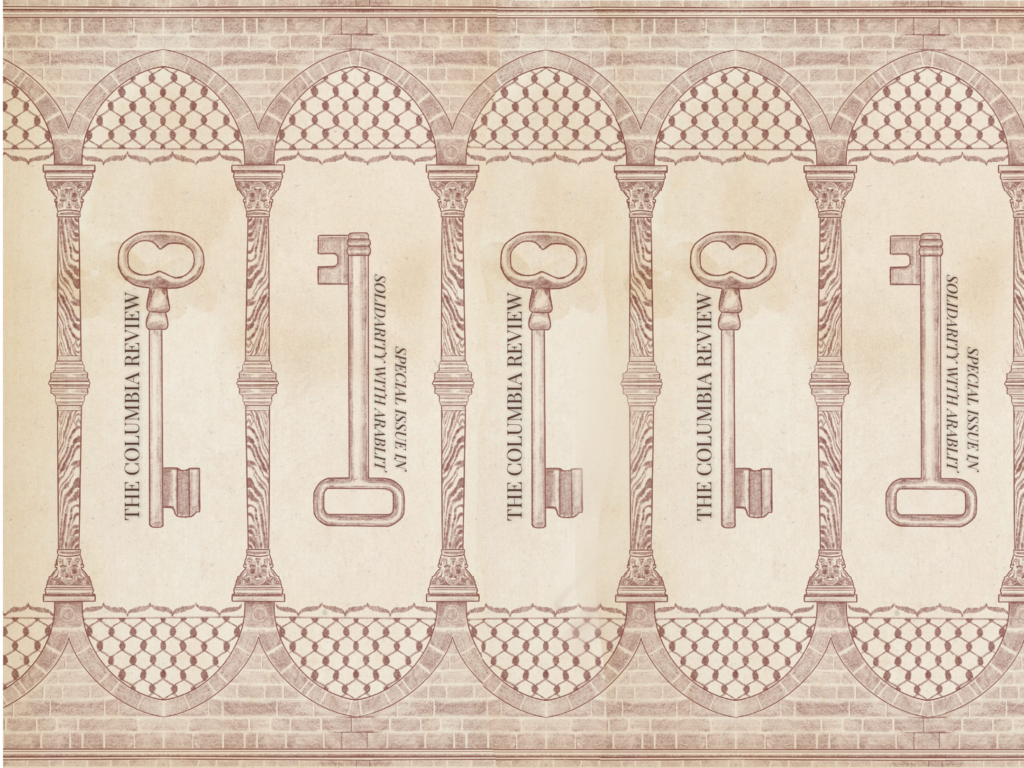Cover Art: “Return Home,” © Ayşegül Şimşek
Editorial Preface
We, the Editors of The Columbia Review, recognize the responsibility of literati to use our platforms to speak on matters of injustice. In light of the annihilation of all universities in Gaza, the ongoing genocide and scholasticide, and the unprecedented carnage inflicted on Palestinians, it is now more than ever that we as literary publications must use our specializations to contribute to a liberation struggle that is both material and ideological.
This project is a rejection of the attempt to silence those voices whose very existence has been deemed threatening. These masterful works of poetry and prose express love and loss, regret and redemption, antiquity and modernity, and above all, an indefatigable resilience in the face of overwhelming oppression. To compose in times of crisis is a radical act of resistance, and it is our great privilege to be able to stand in solidarity with our fellow writers.
Lastly, as a member of Columbia University Apartheid Divest, we call on our university to meet the demands of the student protestors who refuse complicity in Columbia’s economic and academic stakes in Israel. At great personal cost, these people of conscience refuse to be on the wrong side of history—and we urge Columbia to do the same.
In solidarity,
The Editors of The Columbia Review, with Arablit
September 25th, 2024
This project is a rejection of the attempt to silence those voices whose very existence has been deemed threatening. These masterful works of poetry and prose express love and loss, regret and redemption, antiquity and modernity, and above all, an indefatigable resilience in the face of overwhelming oppression. To compose in times of crisis is a radical act of resistance, and it is our great privilege to be able to stand in solidarity with our fellow writers.
Lastly, as a member of Columbia University Apartheid Divest, we call on our university to meet the demands of the student protestors who refuse complicity in Columbia’s economic and academic stakes in Israel. At great personal cost, these people of conscience refuse to be on the wrong side of history—and we urge Columbia to do the same.
In solidarity,
The Editors of The Columbia Review, with Arablit
September 25th, 2024
Acknowledgements and Translator’s Note
These translations have been the culmination of an eight months long effort, starting in February of this year. We would like to express our deep thanks to the organizing committee of Palestine Writes for connecting us with Ameer, as well as the faculty at Columbia whose advice and comments have been invaluable at every stage of production and revision.
Initially starting as a Columbia Review initiative hoping to highlight Palestinian literature, recent events have necessitated a change in political strategy. Specifically, we understood how the timeliness of the release of these translations would strengthen their impact, as well as pressure our university to take action. As a result, we narrowed the scope of the project in an effort to prioritize quality. For those who are intrigued by Ameer’s work and would like to read more, we highly recommend both his published prose and his poetry collection: Gigi and Ali’s Rabbit and I Searched for their Keys in the Locks, respectively.
Lastly, this project would never have been completed without Ameer’s help. Graciously giving us permission to interpret these formidable works of art, his insight and responsiveness have significantly aided the translation process, and it is now our great honor to be able to share them with the world.
Signed,
Amine Bit, Gabrielle Alvarez, Hoda Ali
Initially starting as a Columbia Review initiative hoping to highlight Palestinian literature, recent events have necessitated a change in political strategy. Specifically, we understood how the timeliness of the release of these translations would strengthen their impact, as well as pressure our university to take action. As a result, we narrowed the scope of the project in an effort to prioritize quality. For those who are intrigued by Ameer’s work and would like to read more, we highly recommend both his published prose and his poetry collection: Gigi and Ali’s Rabbit and I Searched for their Keys in the Locks, respectively.
Lastly, this project would never have been completed without Ameer’s help. Graciously giving us permission to interpret these formidable works of art, his insight and responsiveness have significantly aided the translation process, and it is now our great honor to be able to share them with the world.
Signed,
Amine Bit, Gabrielle Alvarez, Hoda Ali
A Note on the Author
Ameer Hamad is a Palestinian poet, short story writer, and translator based in Jerusalem. His work has been published in numerous publications, including Beirut Literature Magazine, The New Arab, and ArabLit, amongst others. In 2019, Ameer was awarded the Qattan Foundation’s Young Writer of the Year Award, and Gigi and Ali’s Rabbit, his prose collection, as well as I Searched for their Keys in the Locks, his poetry collection, were published in 2022.
Translator Bios
Amine Bit is a fourth-year student at Columbia University studying Comparative Literature and Society, working in Arabic, English, and French. He serves as the Events Editor of The Columbia Review.
Gabrielle Alvarez is a fourth-year student at Columbia University studying English Literature and Arabic.
Hoda Ali is a Columbia University graduate.
Gabrielle Alvarez is a fourth-year student at Columbia University studying English Literature and Arabic.
Hoda Ali is a Columbia University graduate.

